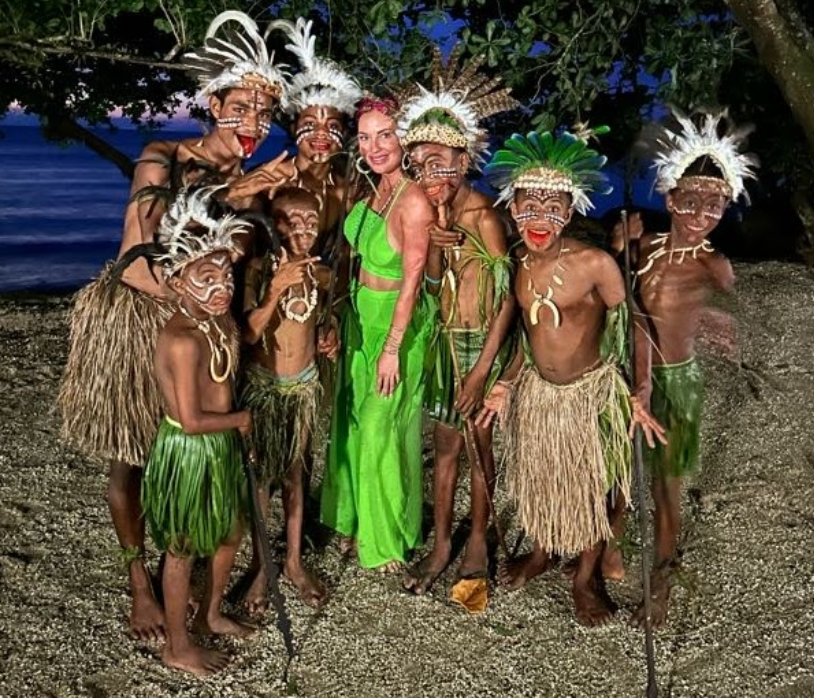
Disclaimer: while I really did travel to Papua New Guinea solo, I also went there to become an ambassador for the NGO, PNG Tribal Foundation, and was accompanied by their founder who is from there. I only recommend traveling to PNG with an established guide/company/organization as tourism is still in development and it’s difficult to navigate logistically! Also, I am a professional full time traveler, so my idea of feeling safe might be different than yours!
Ever since I was savagely bitten by the travel bug almost ten years ago, when I first started aggressively seeking to travel the world, Papua New Guinea had been at the top of my bucketlist. It was right up there with places like Antarctica, Madagascar, and Easter Island. I guess you can say I have an attraction to remote places that aren’t easy for anyone to just go to like it’s a vacation.
The most I knew about Papua New Guinea was that it was one of the last places that still has indigenous tribes and unexplored jungles. Of course, along with this I also heard the stereotypes that come with most remote regions which also tend to deter the average tourists, like “it’s dangerous”, and “it’s really difficult, you can’t just go there”.
To be honest, the lack of positive content (or content at all for that matter), or information about how to actually plan a trip there is what I’d say kept me from checking off this bucketlist destination for nearly ten years. Well, and also the tiny fact that the flights there were some of the most expensive in the world.
I went to Antarctica (three times), journeyed across rugged and “dangerous” terrain in Madagascar to meet their last indigenous tribe, and made friends with some of the last Rapa Nui bloodline in Easter Island. I traveled to 125 countries, mostly solo, and to many places deemed “dangerous” by the media, but I still hadn’t made it to Papua New Guinea.
That is until one fateful day, when I was on a boat free-diving with whale sharks in Isla Mujeres, Mexico. There were some other guests on the boat, and one of them was a woman who swam like a mermaid, who asked me what was next on my bucketlist after I told her my job was a professional travel blogger/influencer. I told her one of them was Papua New Guinea, and to my surprise, she said she had been there! She also told me the best way to experience PNG, is through PNG Tribal Foundation, and that she could connect me with the founder in case there was a way to work together.
I sent a message to the woman, not expecting a response, but to my surprise again, she connected me with the PNG Tribal Foundation’s founder, GT, and after a couple of interviews, I was offered the opportunity to come experience PNG as one of their ambassadors for change. I was beyond excited, not just to finally go there, but to be a part of something bigger, and help change the negative stereotypes into positive ones; something that I truly believe PNG deserves.
Flipping stereotypes in countries is something I am extremely passionate about, and one of my personal goals with my travels. When I hear people calling an entire country dangerous, it just makes me want to go there even more, and so far I’ve been to some of the “most dangerous” countries and have had a phenomenal time. In the past I helped change the negative stereotypes of Egypt, India, and D.R.Congo, so I felt very strongly that I could do the same in Papua New Guinea.
Since most people say “Papua New Guinea is dangerous” I wanted to go there and understand why with the help of PNG Tribal Foundation. The NGO is doing big things to make PNG a safer place, not just for tourists, but for the local people as well.
That being said…yes, there are some dangers in Papua New Guinea. However like most places, it is between locals, and not targeted at foreigners, especially not tourists.
Jump To:
Main Dangers in Papua New Guinea
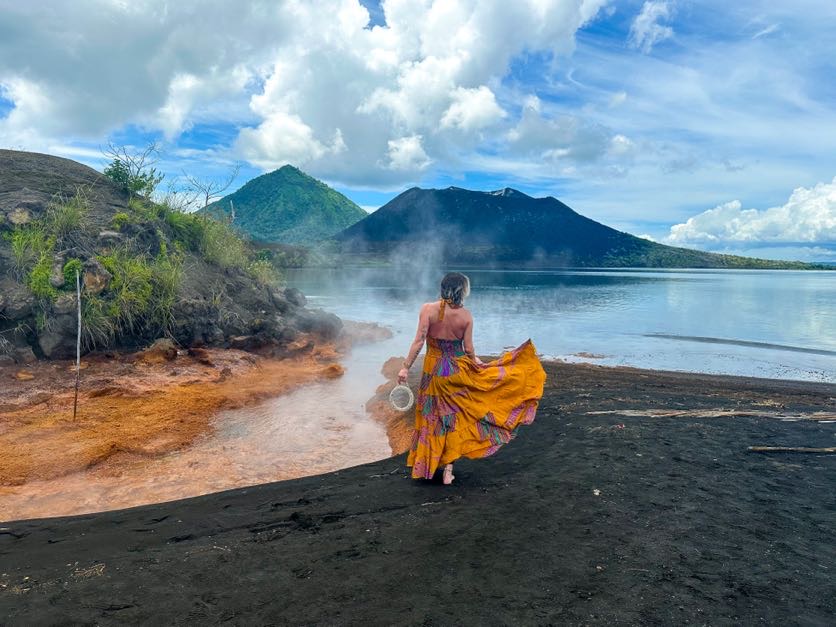
One of the main dangers and safety concerns I hear people say is in regards to theft, kidnapping, and even rape, and mostly in the main cities like Port Moresby. I have only heard of very few cases, and would just like to remind again that things like this unfortunately happen everywhere in the world, including in and DEFINITELY in the USA.
According to GT from PNG Tribal Foundation, “PNG is a developing country where most of the people are very kind and thoughtful. The challenging part is that opportunists have more latitude than they would in more developed countries because PNG does not have enough police. Safeguards that exist in some other countries are not as strong here so crimes of opportunity are more common. They range from petty theft (phone grabbing) to armed hold ups.
Tourists often get into trouble in PNG when they are in the wrong place at the wrong time. That is why you need a trusted local operator. For example, we were going to spend the night in Goroka when we landed instead of drive at night. It’s the experience to limit exposure in PNG that is important.
Most Papua New Guineans are lovely people but the media loves to focus on the few bad apples and their actions.”
PNG Tribal recognized the importance of starting at the root of the problem – people thinking they are powerless and turning to crime – and is working on it by instilling a leadership program called Senisim PNG that empowers and builds confidence. I heard feedback from this program firsthand and was blown away by the outcome of it and the desire to keep expanding it to more people.
I also asked a few locals who responded to my Stories about my visit to PNG about their insights about danger and violence there.
@jetrez__ wrote: I personally do not believe PNG is dangerous in the sense that you should be afraid of it, exercising precautions like any other place you’re in is important, and by researching about certain places before you go there, and also avoiding situations in which you could be in harm’s way are good ways to avoid potential danger. I do believe it is a safe place to visit. Our population is quite low and most of the tourist attractions in the country are in less densely populated areas and the locals there will be more than willing to show you around and be extremely hospitable to you.
Yanamlyn, an awesome young woman doing big things for PNG and PNG Tribal wrote:
Yanamlyn: I will share something that many of us in PNG do not want to acknowledge; locally, many locals are unable to travel to other parts of the country to experience the beauty and culture of that province or locality because it’s unaffordable, let alone spending holidays for families. Some families can afford to do so, others find it an expensive exercise, and with the current airline fares and the state of the economy, it makes it even harder. For this, we rely on the mainstream media for news and current events, including safety concerns. For more current information, many people rely on news shared on social media platforms such as Facebook which most of the time is not trustworthy. I have travelled vastly in my own country because of the work PNG Tribal Foundation does through its Senisin Campaign. I have seen beauty everywhere I go; the people and their way of life – it is so simple! And I have surprised myself more often – I have perceived a certain province in my mind because of the news I hear and see on social media and the mainstream media, but the reality on the ground was always different, calm, peaceful, and everyone was going about their day. Of course violence and ethnic clashes happen every time, but are always immediately taken under control by our law enforcement officers and resolved. I will say this – it is for your own good to research the country before traveling here, but it is even better if you work with a local organization who is here on the ground in the country to work with you so that you gain a more valuable experience. I believe the PNG Tribal Foundation hosts adventures called ‘Tribal Ventures’ for visitors who want to visit and experience the real PNG. As a local NGO, we work on changing the mindsets of our people to see both male and females be more valued in their communities. Moreso, we also believe that we have a role to play in portraying PNG in a positive light. Yes, there are so many issues affecting PNG, like any other country, but there are also so many good people and positive actions being taken to make PNG the country it needs to be for the generations to come.
Right now, I do not know of any threat or safety concerns for locals or tourists. The few I can mention is ethnic clashes that happens in big centers of the country from time to time which most of the time is resolved by engaging law enforcement officers, security alert is always high on election periods (next election time is 2027), petty crimes has become normal in the cities of Port Moresby, Lae, and Mt. Hagen (you may lose your phone or wallet if you hold them out in public areas),
Danger of Sorcery-Accused Related Violence
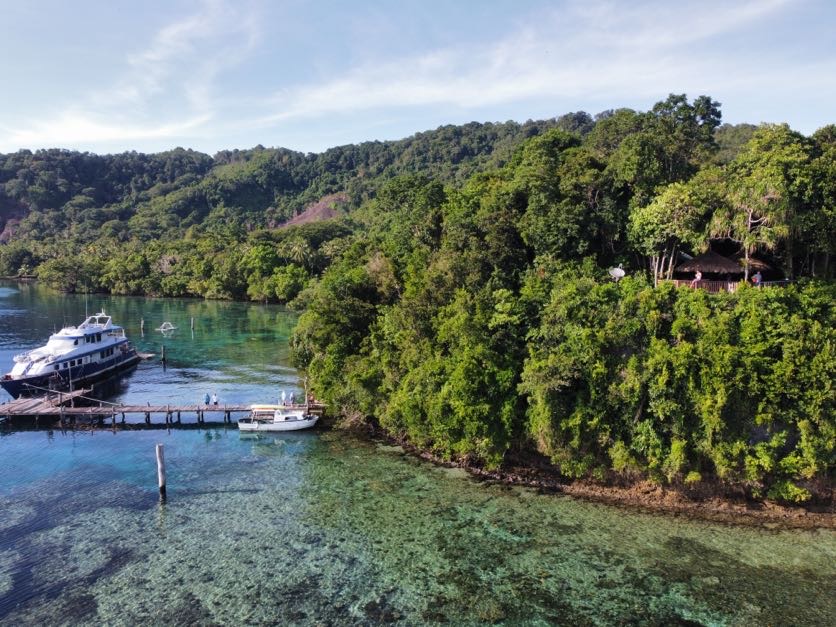
Another big safety concern, and probably the biggest danger (for locals, not tourists) is something called SARV, which stands for Sorcery Accusation-Related Violence, which started just 10-15 years ago.
You may have heard about it if you’ve heard anything related to “burning of women accused of being witches”.
It’s been hard to find a way to talk about this, because I worry that just the word “sorcery” alone will misconstrue what’s actually happening. So please be sure to read this entire section before making any judgments about the entire country!
In short, many tribes and communities are tricked to believe that if someone dies suddenly without any sign of sickness or old age, that there is a sorcerer in their community who caused it and took the heart of the deceased. They are told that if they torture and kill the “sorcerer”, the heart will be replaced. To find out who the “sorcerer” is, they must pay the people who made up this concept; the Glassman or Glassmary (if it’s a woman)…who are technically also considered sorcerers, yet nothing happens to them. These terrible people usually pick the weakest woman, and even if she survives, she will be scarred for life and forced to live in exile.
PNG Tribal Foundation has a huge initiative to stop SARV called Senisim Pasin while also helping the women affected by it. The main way to stop it is to hold the torturers, rapists, and murderers accountable by sending them to jail – something that most people there would rather die than do. If they can get more people convicted and jailed, it will be a strong warning to others to stop.
The main problem is the government and police not doing enough to help with this and a very slow justice system. PNG Tribal continues to raise funds to pay for prosecution expenses, and refugee communities to keep the affected women safe.
There’s also the problem of gender-based violence. SARV mainly targets women, and in most places (in PNG and the world) women are highly undervalued, and therefore their lives aren’t seen as important, which leads to little sympathy when it comes to torture, rape, and murder.
To combat this specific issue, PNG Tribal Foundation is also working on instilling Gender Appreciation through programs that teach both men and women to appreciate the values the other holds.
FUN FACT: There are some matriarch communities in Papua New Guinea where the women are in charge!
Did Either Issue Make Me Feel Unsafe in Papua New Guinea?
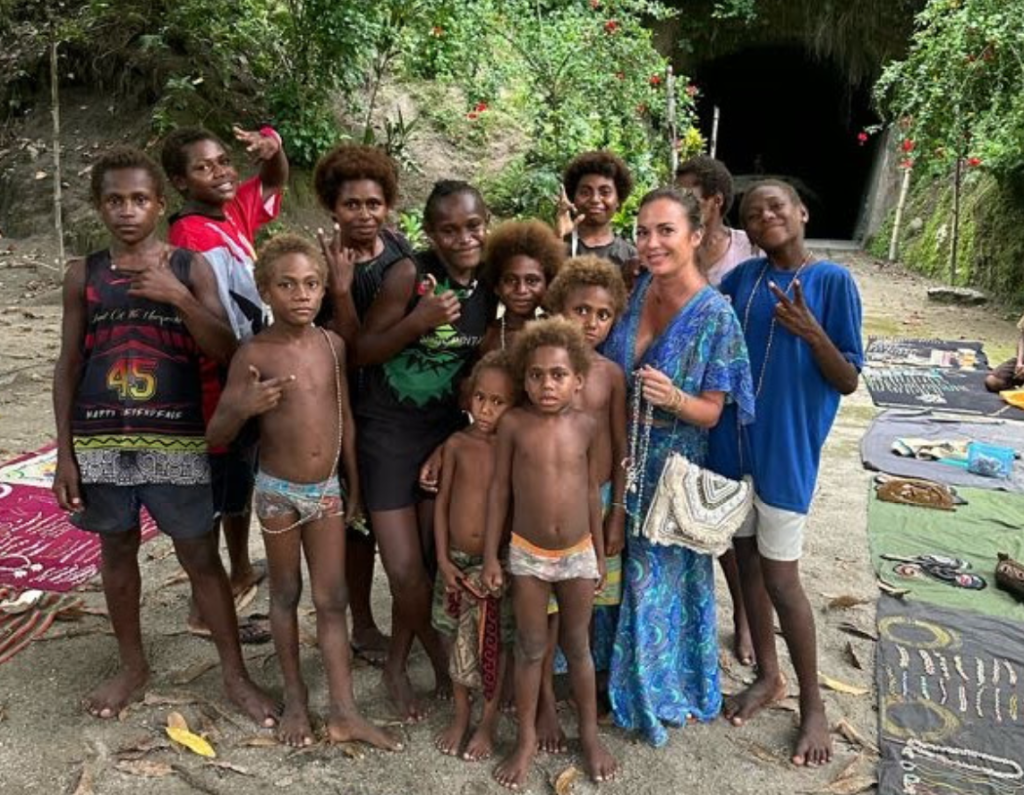
For me, I didn’t see either issue a reason NOT to visit PNG. I saw it as a reason to go there and see what I can do to help, and how to figure out a way that tourism can help too. As a responsible traveler, I didn’t ignore the many safety warnings though, which is why I went with a very trusted and reputable organization.
My only slight safety concern was the main city of Port Moresby, but to be clear, I have safety concerns about MOST main cities that I visit. Even (and especially) in USA. I heard plenty of stories of people saying they were told not to walk there at night, and even one person saying the hotel locked them inside at night.
But we went out in Port Moresby a few times and I really didn’t see or feel danger. I know better than to walk in certain areas at night, and I don’t go out at night usually anyway, so simply being a smart and responsible traveler easily made me feel safe.
We also went to remote islands, and to places like WWII tunnels, and even a remote area with caves filled with skulls from cannibalism 100 years ago, and I still didn’t feel unsafe.
How Tourism Can Help Increase Safety Measures in Papua New Guinea

After spending ten days in PNG, and experiencing some of the most unexpected beautiful places and people, and seeing what PNG Tribal is doing to help people, I really wanted to give others the opportunity to have the same experience and do what we can to help as well.
I believe that increasing tourism will motivate locals to be more aware of the negative impacts SARV has, and how it makes people afraid to visit. I also believe that with more visits and social media attention, the people of Papua New Guinea will see that there are many many more people than they realize who are eager to come to their beautiful country, which will help gain confidence and ambition to start more jobs in tourism, or at least contribute to making their country a safer place to visit.
Papua New Guinea has been visited frequently in the past, mostly by Australians and Europeans, however like most countries, it took a hard hit from Covid, and of course, the negative stereotypes about danger don’t help.
I asked some locals, including the tour operator who took us to the Duke of York Islands why they thought there isn’t more tourism and what they felt the impact of tourism would have on Papua New Guinea, here’s what they said:
@rabaul.historicaltours: I do tours for nearly 8 years from now. The most favorite one is Volcano Hiking and other Sea Tour Activities. My average tourists per year is between 8-100 tourists. For this year alone I already reached 62 and there are still more coming up so I think this would reach nearly 200+. PNG’s government negligence to identify potential tourism sites and develop them to attract more tourists, and lack of supporting tourism stakeholders across the country, and failure to strengthen the law and order in the country (are why I think there isn’t more tourism in PNG). Increasing the number of tourists may help ease the financial burden most of our locals go through during these trying times. The tourism dollar will then circulate amongst locals and possibly impact the greater communities. As such, would command the safety and security of our visitors who are to be considered on a high note by our citizens.
@jetrez__: There are multiple benefits for locals in my country if more tourists visited. To name a few; tourists bring in a lot of money, this helps stimulate local economies where formal jobs aren’t readily available, and the locals sustain themselves through agriculture. The locals also get to facilitate a healthy cultural exchange, a first hand experience with someone from a different country is sure to enlighten their minds and ways of thinking and vice versa. Last but not least, tourism drives infrastructure development, it forces governments to build better roads, hospitals, etc. in those areas where tourists flock to. This inturn gives more access for locals to obtain basic services.
@consciouskumul (Yanamlyn): I think this is an excellent idea! I believe it will work. I do have to share this, and I do not want you to feel I am discounting your idea ( I think it’s awesome!) – when we help/ or when people realise that there is so much opportunity in just being good citizens who are law abiding, they will make it become part of their values going forward. If we make people think they should be rewarded for doing good, we may harm them in the long run and that change will not be sustainable. I work with my little village and I always remind them to be good citizens regardless of whether the government of the day supports us with proper medical supplies in a year or after 5 years, we must stay true to our values, and the good things will come to us as blessings. We are seeing some rays of hope now, after more than 50 years of no road connection. Now, I will be able to drive home to my village from Port Moresby in 2-3 years time.
The idea is to get people into the habit of doing good without telling them of the opportunities that may come with it, including in monetary value. This then becomes something genuine and sustainable.
How You Can Travel to Papua New Guinea
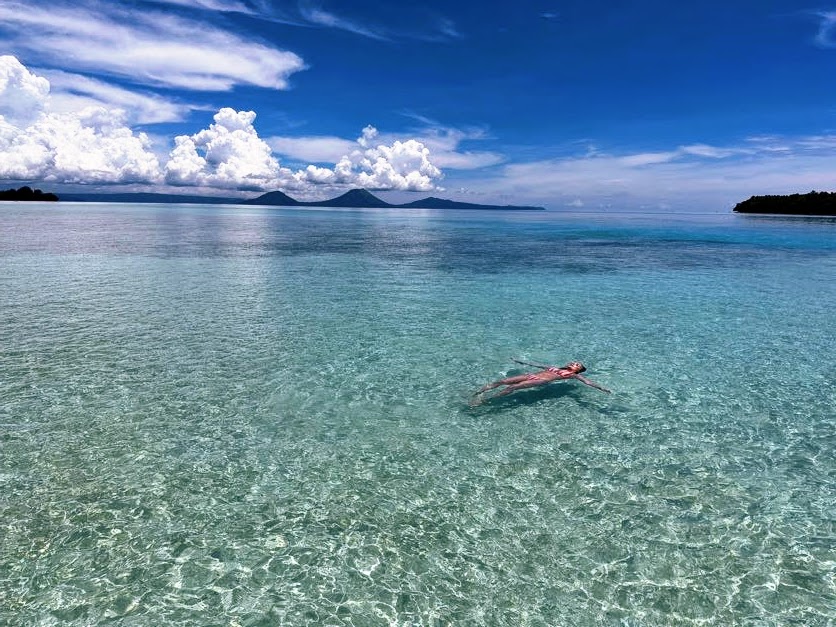
As I mentioned initially in the disclaimer, Papua New Guinea isn’t really a destination you just arrive at and figure out what to do. Getting anywhere outside of Port Moresby requires a flight (and sometimes a bus and a boat), and there aren’t a ton of accommodation options. I highly recommend booking an organized tour with someone who knows the country very well like PNG Tribal Foundation’s Tribal Ventures.
Be sure to check out my Ultimate Papua New Guinea Travel Guide for info on traveling there, and also the sign up link to our future group trip with PNG Tribal Foundation!
We’re hoping to help kick back up their tourism by spreading the positive stories and beautiful content across social media, and by hosting a safe, guided ambassador group trip next year. This trip is intended for true travelers who also have an interested in promoting awareness about the country and the causes that PNG Tribal Foundation is fighting for.
*Note: this trip requires more screening than my other trips as it is through an NGO and we need to make sure everyone knows it is not just a trip for a tropical vacation!
What I Loved Most in Papua New Guinea
There are so many things I loved about Papua New Guinea, that I truly hope many other intrepid travelers get to experience. From the absolutely stunning landscapes and crystal clear waters in areas like the Duke of York Islands, to the fascinating cultural practices of the 1000+ tribes that live there.
Every person I encountered was extremely friendly and welcoming, with an overall vibe of happiness that was absolutely invigorating. It really made me want to get more travelers there to visit.
For a full post on all of the places I went to in Papua New Guinea, please check out this post!
Please don’t forget! I work extremely hard to produce these free travel guides and posts! If it helped you, or you enjoyed it, PLEASE give it a share on social media, and follow me to keep up with more posts! You’re two minutes of effort truly helps keep my business running! Thank ya!
xx, Alyssa



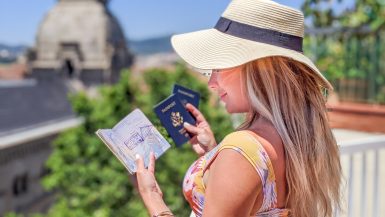
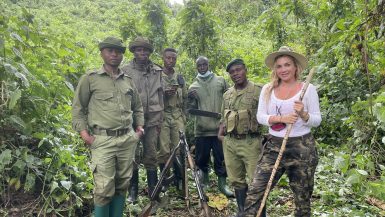
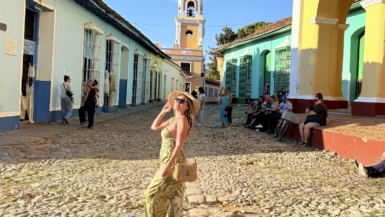
Hi Allysa!
I am also a experienced solo female traveler and this part of the world has always been intriguing… Would you have a private guide to recommend me? I would like to do some trekking and go into tribes that aren’t touristy and safe… thanks for your insight!
Hello! I went with an NGO and everything was arranged through them. I believe they offer trips sometimes if you want to get in touch! They are PNGTribal Foundation!
Thank you for Visiting Papua New Guinea 🇵🇬✌️🙏
Proud you did come and experience the warmt of the ocean
Much lov
J
Proud Papua New Guinean ✌️🇵🇬
Thank you so much! I love Papua New Guinea!
Thank you for sharing such effective and useful information, and I will request that you keep updating us.
I just wanted to say that your article on solo travel was really helpful and well-written. Keep up the great work, and I’m looking forward to reading more from you!
Thank you!
heyy, thanks for amazing post!!
i’m fellow traveler from lithuania and i’m dreaming to visit PNG, i film travel vlogs as well and i was wondering do they have tourist city boards or something that other travelers can collaborate with?
thanks
Hi! I don’t know of any, but maybe there might be Facebook pages or something? Not many people go there so it’s hard to say! I’m hosting a group trip there in September though!
Very nice blog, enjoyed reading your experience and thanks for sharing with us.Cheers!!
Thank you!
Great blog post. Will admit PNG wasn’t on my travel wish list until your posts.
So many great things I hadn’t heard or seen about PNG before, (the Dolphins)
Out of interest, what additional screening would NGO Complete
*Note: this trip requires more screening than my other trips as it is through an NGO and we need to make sure everyone knows it is not just a trip for a tropical vacation!